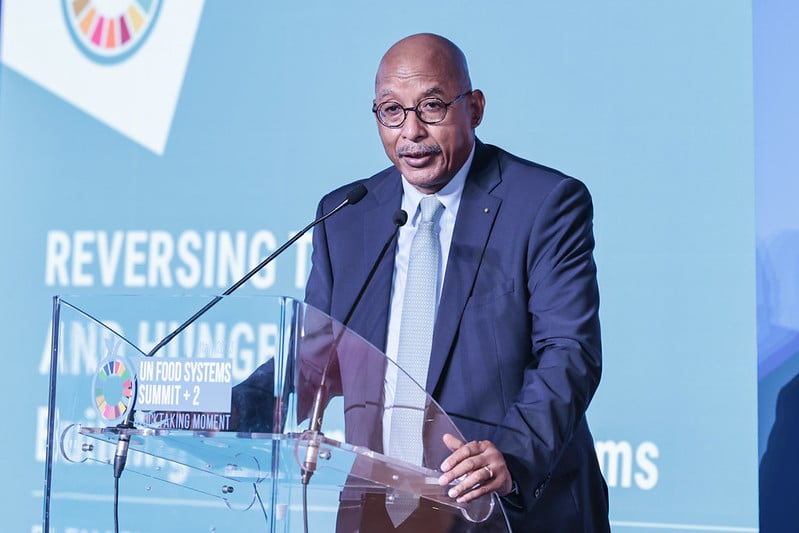
Africa’s relationship with the world is changing.
Since the end of the second world war, the prevailing multilateral model has largely seen Africa through the prism of dependency on overseas development assistance, or “ODA” – where public funds are sent to support development for either humanitarian or politically strategic reasons.
It is becoming increasingly clear now that we are transitioning to a “post-ODA” world. Many historically important government donors are slashing their ODA budgets, for instance France’s €742 million budget cut in 2024 and plans are underway for similar levels of cuts in Germany and the United States next year.
Meanwhile, Africa is forging ahead in drafting an ambitious and broad transformation agenda. In the agriculture sector, for instance, its new Comprehensive African Agricultural Development Programme (CAADP) will set growth targets to scale up sustainable food production, agro-Industrialization, and trade while promoting inclusive and equitable livelihoods.
Why does this matter? In any era of change, it is easy for international collaboration to simply recede. But instead, we must reimagine how the relationship between Africa and the world is structured, based upon the principles of mutual self-interest and agency.
By 2100, Africa is projected to be home to four in 10 people on the planet. Between now and 2030 alone, Africa’s food and agriculture economy could potentially more than triple from $280 billion to $1 trillion in value annually. The continent is home to 65 per cent of the world’s uncultivated arable land, and its young and growing work force has the potential for huge productivity gains of as much as 50 per cent if given the right skills and resources.
Take Sierra Leone’s “Feed Salone” strategy as an example. In just one year, Government-led initiatives generated over 10,000 agricultural jobs, reduced rice imports by 15 per cent, and raised cocoa exports by 20 per cent, translating directly to enhanced food security, economic growth and resilience.
The world would be short-sighted to not see the opportunity that Africa presents on the global stage in terms of both growth but also stability. As countries become stronger, they are better able to stem migration, encourage innovation and contribute to global development goals. One should remember that faced with economic stagnation, political turmoil or environmental challenges, in the past, countries like Spain, Italy, Portugal and Sweden were once, also, nations of emigration.
Despite this potential and progress to date, African nations remain at the very sharp end of global challenges. They bear the brunt of climate change despite accounting for the smallest share – less than 4 per cent – of global emissions.
Southern Africa, for example, has suffered its worst drought in 40 years this past year. In Zambia, where 70 per cent of the population is employed in the agricultural sector, 6.6 million people were in urgent need of humanitarian assistance and 1.35 million faced hunger as a result.
Serving national debt in many countries has also become unwieldy as a result. In fact, the Global South paid out tens of billions more in debt repayments last year than they received in new lending or in development aid.
So what does a win-win outcome look like for Africa and the rest of the world? For starters, it should focus on empowering smallholder farmers – who are the true “foot-soldiers” in Africa’s development – by ensuring they have access to much-needed climate finance and to innovative, low-cost, people-driven solutions to boost their yields and resilience.
Additionally, supporting Africa’s burgeoning small and medium-sized enterprises can play a transformative role in building the continent’s agri-food economy – including access to technologies and finance; skills training; investment in infrastructure; and trade, both within Africa and beyond.
Brazil, in its role of President of the G20 this year, is already catalysing formidable political momentum towards this goal. Its newly launched Global Alliance on Hunger and Poverty aims to catalyse funds and knowledge to accelerate this transformation.
The World Bank is seeking over $100 billion replenishment for its International Development Association (IDA), which provides concessional loans to low- and lower-middle-income countries, helping to reduce poverty. Some countries, including Spain, Latvia, Denmark, Poland, Brazil, have already committed to increasing their funding pledges to this work.
History has shown us how quickly countries can shift in their development trajectory – Korea, for example, has transformed in little over one generation from an aid-receiving to a high-income country. Africa’s turn could quite well be next, and it’s in everyone’s interests to help realise this potential.

